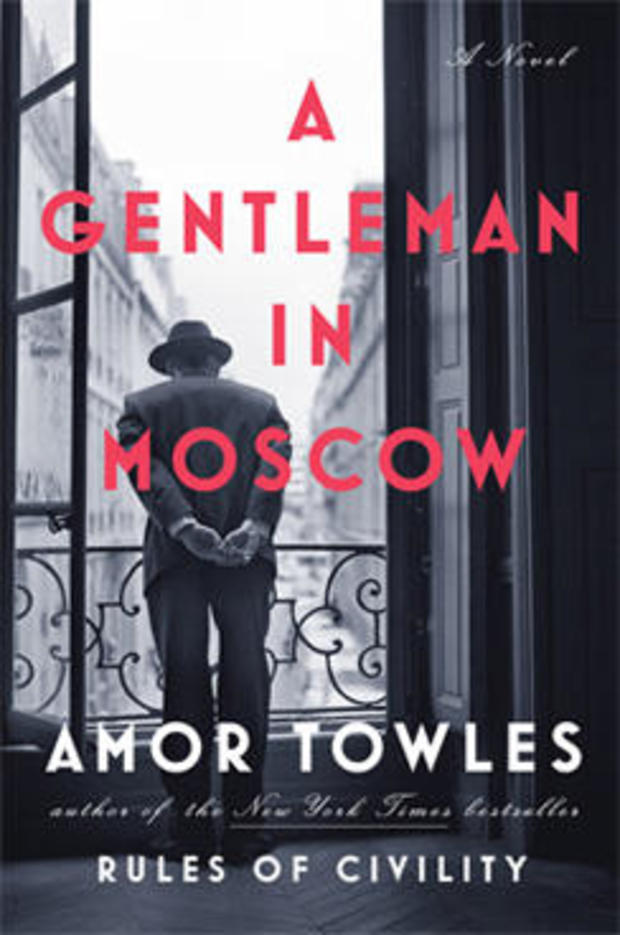Book excerpt: "A Gentleman in Moscow" by Amor Towles
In his bestselling novel "A Gentleman of Moscow," author Amor Towles captures the social upheaval in Russia after the Bolshevik Revolution, as a Russian aristocrat is condemned to spend the rest of his life inside Moscow's famed Metropol Hotel, an art noveau landmark that is as stately and behind the rapidly-changing times as he.
A monumental success, the book has sold more than a million copies and been translated into 30 languages, as readers gravitate to its central character, a man who bears witness to a cascade of history just beyond the Metropol's doors, and who, despite a decades-long detention, never gives up hope.
Read the book's opening chapter below, and don't miss Elizabeth Palmer's interview with Amor Towles on "CBS Sunday Morning" March 31!
1922
An Ambassador
At half past six on the twenty-first of June 1922, when Count Alexander Ilyich Rostov was escorted through the gates of the Kremlin onto Red Square, it was glorious and cool. Drawing his shoulders back without breaking stride, the Count inhaled the air like one fresh from a swim. The sky was the very blue that the cupolas of St. Basil's had been painted for. Their pinks, greens, and golds shimmered as if it were the sole purpose of a religion to cheer its Divinity. Even the Bolshevik girls conversing before the windows of the State Department Store seemed dressed to celebrate the last days of spring.
"Hello, my good man," the Count called to Fyodor, at the edge of the square. "I see the blackberries have come in early this year!"
Giving the startled fruit seller no time to reply, the Count walked briskly on, his waxed moustaches spread like the wings of a gull. Passing through Resurrection Gate, he turned his back on the lilacs of the Alexander Gardens and proceeded toward Theatre Square, where the Hotel Metropol stood in all its glory. When he reached the threshold, the Count gave a wink to Pavel, the afternoon doorman, and turned with a hand outstretched to the two soldiers trailing behind him.
"Thank you, gentlemen, for delivering me safely. I shall no longer be in need of your assistance."
Though strapping lads, both of the soldiers had to look up from under their caps to return the Count's gaze – for like ten generations of Rostov men, the Count stood an easy six foot three.
"On you go," said the more thuggish of the two, his hand on the butt of his rifle. "We're to see you to your rooms."
In the lobby, the Count gave a wide wave with which to simultaneously greet the unflappable Arkady (who was manning the front desk) and sweet Valentina (who was dusting a statuette). Though the Count had greeted them in this manner a hundred times before, both responded with a wide- eyed stare. It was the sort of reception one might have expected when arriving for a dinner party having forgotten to don one's pants.
Passing the young girl with the penchant for yellow who was reading a magazine in her favorite lobby chair, the Count came to an abrupt stop before the potted palms in order to address his escort.
"The lift or the stairs, gentlemen?"
The soldiers looked from one another to the Count and back again, apparently unable to make up their minds.
How is a soldier expected to prevail on the field of battle, the Count wondered, if he cannot be decisive about ascending to an upper floor?
"The stairs," he determined on their behalf, then vaulted the steps two at a time, as had been his habit since the academy.
On the third floor, the Count walked down the red-carpeted hallway toward his suite – an interconnected bedroom, bath, dining room, and grand salon with eight-foot windows overlooking the lindens of Theatre Square. And there the rudeness of the day awaited. For before the flung-open doors of his rooms stood a captain of the guards with Pasha and Petya, the hotel's bellhops. The two young men met the Count's gaze with looks of embarrassment, having clearly been conscripted into some duty they found distasteful. The Count addressed the officer.
"What is the meaning of this, Captain?"
The captain, who seemed mildly surprised by the question, had the good training to maintain the evenness of his affect.
"I am here to show you to your quarters."
"These are my quarters."
Betraying the slightest suggestion of a smile, the captain replied, "No longer, I'm afraid."
Leaving Pasha and Petya behind, the captain led the Count and his escort to a utility stair
hidden behind an inconspicuous door in the core of the hotel. The ill-lit ascent turned a sharp corner every five steps in the manner of a belfry. Up they wound three flights to where a door opened on a narrow corridor servicing a bathroom and six bedrooms reminiscent of monastic cells. This attic was originally built to house the butlers and ladies' maids of the Metropol's guests; but when the practice of traveling with servants fell out of fashion, the unused rooms had been claimed by the caprices of casual urgency – thenceforth warehousing scraps of lumber, broken furniture, and other assorted debris.
Earlier that day, the room closest to the stairwell had been cleared of all but a cast-iron bed, a three-legged bureau, and a decade of dust. In the corner near the door was a small closet, rather like a telephone box, that had been dropped in the room as an afterthought. Reflecting the pitch of the roof, the ceiling sloped at a gradual incline as it moved away from the door, such that at the room's outer wall the only place where the Count could stand to his full height was where a dormer accommodated a window the size of a chessboard.
As the two guards looked on smugly from the hall, the good captain explained that he had summoned the bellhops to help the Count move what few belongings his new quarters would accommodate.
"And the rest?"
"Becomes the property of the People."
So this is their game, thought the Count.
"Very well." Back down the belfry he skipped as the guards hurried behind him, their rifles clacking against the wall. On the third floor, he marched along the hallway and into his suite where the two bellhops looked up with woeful expressions.
"It's all right, fellows," the Count assured and then began pointing: "This. That. Those. All the books."
Among the furnishings destined for his new quarters, the Count chose two high-back chairs, his grandmother's oriental coffee table, and a favorite set of her porcelain plates. He chose the two table lamps fashioned from ebony elephants and the portrait of his sister, Helena, which Serov had painted during a brief stay at Idlehour in 1908. He did not forget the leather case that had been fashioned especially for him by Asprey in London and which his good friend Mishka had so appropriately christened the Ambassador.
Someone had shown the courtesy of having one of the Count's traveling trunks brought to his bedroom. So, as the bellhops carried the aforementioned upward, the Count filled the trunk with clothes and personal effects. Noting that the guards were eyeing the two bottles of brandy on the console, the Count tossed them in as well. And once the trunk had been carried upstairs, he finally pointed to the desk.
The two bellhops, their bright blue uniforms already smudged from their efforts, took hold of it by the corners.
"But it weighs a ton," said one to the other.
"A king fortifies himself with a castle," observed the Count, "a gentleman with a desk."
As the bellhops lugged it into the hall, the Rostovs' grandfather clock, which was fated to be left behind, tolled a doleful eight. The captain had long since returned to his post and the guards, having swapped their belligerence for boredom, now leaned against the wall and let the ashes from their cigarettes fall on the parquet floor while into the grand salon poured the undiminished light of the Moscow summer solstice.
With a wistful eye, the Count approached the windows at the suite's northwest corner. How many hours had he spent before them? How many mornings dressed in his robe with his coffee in hand had he observed the new arrivals from St. Petersburg disembarking from their cabs, worn and weary from the overnight train? On how many winter eves had he watched the snow slowly descending as some lone silhouette, stocky and short, passed under a street lamp? At that very instant, at the square's northern extreme a young Red Army officer rushed up the steps of the Bolshoi, having missed the first half hour of the evening's performance.
The Count smiled to remember his own youthful preference for arriving entr'acte. Having insisted at the English Club that he could only stay for one more drink, he stayed for three. Then leaping into the waiting carriage, he'd flash across the city, vault the fabled steps, and like this young fellow slip through the golden doors. As the ballerinas danced gracefully across the stage, the Count would be whispering his excusez-moi's, making his way to his usual seat in the twentieth row with its privileged view of the ladies in the loges.
Arriving late, thought the Count with a sigh. What a delicacy of youth.
Then he turned on his heels and began to walk his rooms. First, he admired the salon's grand dimensions and its two chandeliers. He admired the painted panels of the little dining room and the elaborate brass mechanics that allowed one to secure the double doors of the bedroom. In short, he reviewed the interior much as would a potential buyer who was seeing the rooms for the very first time. Once in the bedroom, the Count paused before the marble-topped table on which lay an assortment of curios. From among them, he picked up a pair of scissors that had been prized by his sister. Fashioned in the shape of an egret with the long silver blades representing the bird's beak and the small golden screw at the pivot representing its eye, the scissors were so delicate he could barely fit his thumb and finger through the rings.
Looking from one end of the apartment to the other, the Count took a quick inventory of all that would be left behind. What personal possessions, furnishings, and objets d'art he had brought to this suite four years before were already the product of a great winnowing. For when word had reached the Count of the Tsar's execution, he had set out from Paris at once. Over twenty days, he had made his way across six nations and skirted eight battalions fighting under five different flags, finally arriving at Idlehour on the seventh of August 1918, with nothing but a rucksack on his back. Though he found the countryside on the verge of upheaval and the household in a state of distress, his grandmother, the Countess, was characteristically composed.
"Sasha," she said without rising from her chair, "how good of you to come. You must be famished. Join me for tea."
When he explained the necessity of her leaving the country and described the arrangements he had made for her passage, the Countess understood that there was no alternative. She understood that although every servant in her employ was ready to accompany her, she must travel with two. She also understood why her grandson and only heir, whom she had raised from the age of ten, would not be coming with her.
When the Count was just seven, he was defeated so soundly by a neighboring boy in a game of draughts that, apparently, a tear was shed, a curse was uttered, and the game pieces were scattered across the floor. This lack of sportsmanship led to a stiff reprimand from the Count's father and a trip to bed without supper. But as the young Count was gripping his blanket in misery, he was visited by his grandmother. Taking a seat at the foot of the bed, the Countess expressed a measure of sympathy: "There is nothing pleasant to be said about losing," she began, "and the Obolensky boy is a pill. But, Sasha, my dear, why on earth would you give him the satisfaction?" It was in this spirit that he and his grandmother parted without tears on the docks in Peterhof. Then the Count returned to the family estate in order to administer its shuttering.
In quick succession came the sweeping of chimneys, the clearing of pantries, and the shrouding of furniture. It was just as if the family were returning to St. Petersburg for the season, except that the dogs were released from their kennels, the horses from their stables, and the servants from their duties. Then, having filled a single wagon with some of the finest of the Rostovs' furniture, the Count bolted the doors and set out for Moscow.
'Tis a funny thing, reflected the Count as he stood ready to abandon his suite. From the earliest age, we must learn to say good-bye to friends and family. We see our parents and siblings off at the station; we visit cousins, attend schools, join the regiment; we marry, or travel abroad. It is part of the human experience that we are constantly gripping a good fellow by the shoulders and wishing him well, taking comfort from the notion that we will hear word of him soon enough.
But experience is less likely to teach us how to bid our dearest possessions adieu. And if it were to? We wouldn't welcome the education. For eventually, we come to hold our dearest possessions more closely than we hold our friends. We carry them from place to place, often at considerable expense and inconvenience; we dust and polish their surfaces and reprimand children for playing too roughly in their vicinity – all the while, allowing memories to invest them with greater and greater importance. This armoire, we are prone to recall, is the very one in which we hid as a boy; and it was these silver candelabra that lined our table on Christmas Eve; and it was with this handkerchief that she once dried her tears, et cetera, et cetera. Until we imagine that these carefully preserved possessions might give us genuine solace in the face of a lost companion.
But, of course, a thing is just a thing.
And so, slipping his sister's scissors into his pocket, the Count looked once more at what heirlooms remained and then expunged them from his heartache forever.
Excerpted from "A Gentleman in Moscow." Copyright © 2016 by Amor Towles. Published by Penguin Books, an imprint of Penguin Publishing Group, a division of Penguin Random House, LLC All Rights Reserved.
For more info:
- "A Gentleman in Moscow" by Amor Towles (Viking), in Hardcover, Trade Paperback, eBook and Audio formats, available via Amazon
- Metropol Hotel, Moscow




